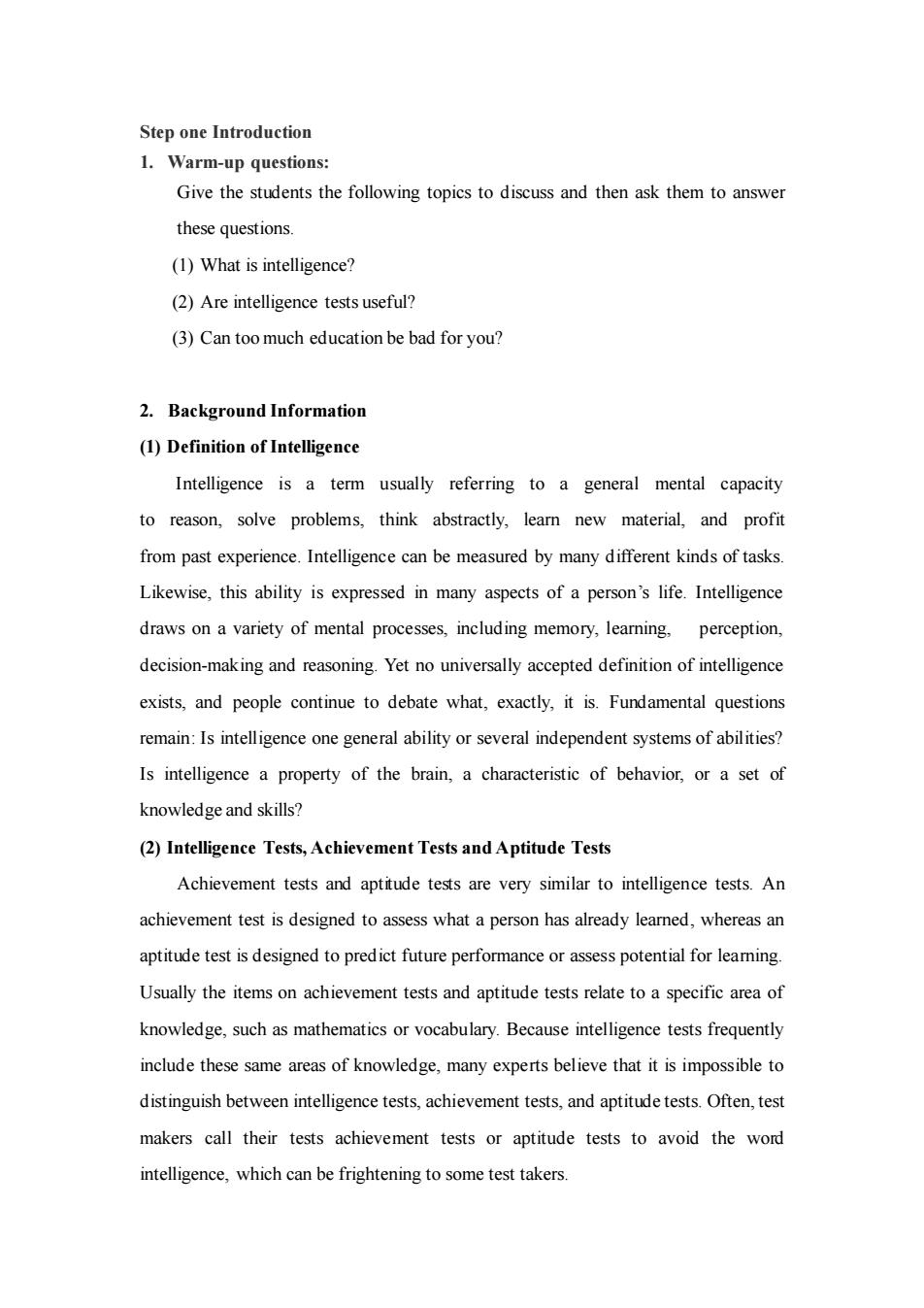正在加载图片...

Step one Introduction 1.Warm-up questions Give the students the following topics to discuss and then ask them to answer these questions (1)What is intelligence? (2)Are intelligence tests useful? (3)Can too much education be bad for you? 2.Background Information (1)Definition of Intelligence Intelligence is a term usually referring to a general mental capacity to reason,solve problems,think abstractly,learn new material,and profit from past experience.Intelligence can be measured by many different kinds of tasks. Likewise,this ability is expressed in many aspects of a person's life.Intelligence draws on a variety of mental processes,including memory,learning.perception, decision-making and reasoning.Yet no universally accepted definition of intelligence exists,and people continue to debate what,exactly,it is.Fundamental questions remain:Is intelligence one general ability or several independent systems of abilities? Is intelligence a property of the brain,a characteristic of behavior,or a set of knowledge and skills? (2)Intelligence Tests,Achievement Tests and Aptitude Tests Achievement tests and aptitude tests are very similar to intelligence tests.An achievement test is designed to assess what a person has already leared,whereas an aptitude test is designed to predict future performance or assess potential for leaming. Usually the items on achievement tests and aptitude tests relate toa specific area of knowledge,such as mathematics or vocabulary.Because intelligence tests frequently include these same areas of knowledge,many experts believe that it is impossible to distinguish between intelligence tests,achievement tests,and aptitude tests.Often,test makers call their tests achievement tests or aptitude tests to avoid the word intelligence,which can be frightening to some test takers. Step one Introduction 1. Warm-up questions: Give the students the following topics to discuss and then ask them to answer these questions. (1) What is intelligence? (2) Are intelligence tests useful? (3) Can too much education be bad for you? 2. Background Information (1) Definition of Intelligence Intelligence is a term usually referring to a general mental capacity to reason, solve problems, think abstractly, learn new material, and profit from past experience. Intelligence can be measured by many different kinds of tasks. Likewise, this ability is expressed in many aspects of a person’s life. Intelligence draws on a variety of mental processes, including memory, learning, perception, decision-making and reasoning. Yet no universally accepted definition of intelligence exists, and people continue to debate what, exactly, it is. Fundamental questions remain: Is intelligence one general ability or several independent systems of abilities? Is intelligence a property of the brain, a characteristic of behavior, or a set of knowledge and skills? (2) Intelligence Tests, Achievement Tests and Aptitude Tests Achievement tests and aptitude tests are very similar to intelligence tests. An achievement test is designed to assess what a person has already learned, whereas an aptitude test is designed to predict future performance or assess potential for learning. Usually the items on achievement tests and aptitude tests relate to a specific area of knowledge, such as mathematics or vocabulary. Because intelligence tests frequently include these same areas of knowledge, many experts believe that it is impossible to distinguish between intelligence tests, achievement tests, and aptitude tests. Often, test makers call their tests achievement tests or aptitude tests to avoid the word intelligence, which can be frightening to some test takers